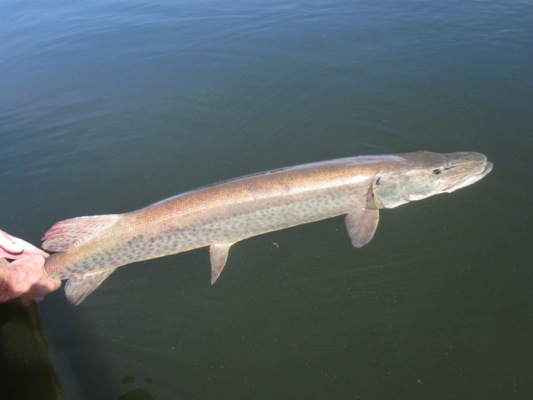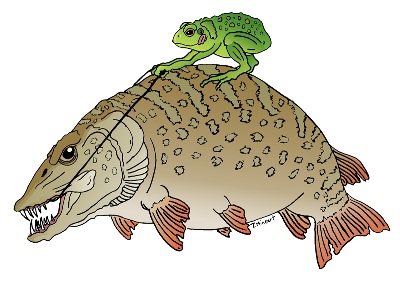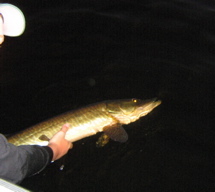|
|

Posts: 8863
| I'm sure you guys have noticed this, but muskies (all species of fish, actually) seem to take on the color of the water they are in. The fish in those really dark tannic stained lakes are almost black sometimes, while clear water fish are lighter and seem like they have more defined markings.
My question is this:
Is this genetic? Is it evolutionary in nature, a product of natural selection?
Is it adaptive? If you put a dark colored fish in gin clear water, would it eventually develop a lighter color, or if you put a light colored fish in one of those coffee colored lakes would develop a darker color??
Is it environmental? Does whatever makes the water that color cause the tissues in the fish to attain that color?
I can tell you that fish smell and taste like the lake they came from, but that's a whole other discussion!! |
|
| |
|

| What you are looking for can be found in here,
http://www.amazon.com/One-Fish-Blue-Read-Myself/dp/0394800133
because real knowledge is in leather-bound books, not the internet. |
|
| |
|

Posts: 8863
| That was a question for the biologists around here, and the people who actually KNOW this stuff. Believe it or not, some of the people who post here on a regular basis actually know what they are talking about. Some are guides, some are accomplished anglers, some are tournament pros, some have made their living on fishing. That adds up to many years of collective knowledge and experience.
Some, however? Unfortunately, some are just clowns. You can usually tell by their avatar... |
|
| |
|
Posts: 968
Location: N.FIB | my cousin lives around adams wis,he and every body on his street has a small pond in there yard.We caught a bunch of white bass about 6-7 yrs ago and put some in his pond,his pond is a darker color and the white bass became darker color almost black in his pond. |
|
| |
|
Posts: 540
Location: MN | Is it adaptive? If you put a dark colored fish in gin clear water, would it eventually develop a lighter color, or if you put a light colored fish in one of those coffee colored lakes would develop a darker color??
I see this with bass on the east end of lake Minnetonka (clear water) I'll catch them pre spawn on rock piles in 10-15fow they are "regular bass" color when I catch those same fish a week later on there beds there black as night they move to a few shallow cuts that have dark bottom. |
|
| |
|
Posts: 2361
| esoxaddict - 1/20/2010 11:29 PM
I'm sure you guys have noticed this, but muskies (all species of fish, actually) seem to take on the color of the water they are in. The fish in those really dark tannic stained lakes are almost black sometimes, while clear water fish are lighter and seem like they have more defined markings.
My question is this:
Is this genetic? Is it evolutionary in nature, a product of natural selection?
Is it adaptive? If you put a dark colored fish in gin clear water, would it eventually develop a lighter color, or if you put a light colored fish in one of those coffee colored lakes would develop a darker color??
Is it environmental? Does whatever makes the water that color cause the tissues in the fish to attain that color?
I can tell you that fish smell and taste like the lake they came from, but that's a whole other discussion!!
I don't know about that smell/taste thing, I'll have to leave that up to you, but hopefully this will cover what you are asking.
Google is the bomb, use it.
d) Matching camouflage is extremely widespread, especially in the tropics. There are several excellent examples of fishes that have active color patterns that match their immediate environment. Some fishes even have a repertoire of several adaptive color patterns. George Barlow (1981) recognized up to eleven such color patterns in Badis badis. Most of these patterns were found to match different surroundings.
http://www.wetwebmedia.com/aqscisubwebindex/coloration.htm
Edited by firstsixfeet 1/21/2010 7:34 AM
|
|
| |
|

Posts: 32954
Location: Rhinelander, Wisconsin | Only FSF would post about a Badass fish. |
|
| |
|
Posts: 2361
| sworrall - 1/21/2010 10:50 AM
Only FSF would post about a Badass fish.
OK, but then you are saying Gadabout's last name is pronounced,
"GAD'ASS"? |
|
| |
|

Posts: 462
Location: Antioch, IL | Fish and reptiles have the ability to manipulate the pigemnt of their skin. They have special cells called chromatiphores (spelling?) that they can open and close. (Fish holding to rocks, dark color, can move to a sandy beach and within minutes can lighten up dramaticaly to blend into the surroundings. Squid, cuttle fish and octopi have such enhanced ability to change color that they are thought to use it as a form of communication. Check out some video of it if you get a chance. Pretty cool stuff. |
|
| |
|
| If you sit out in the sun all day will your skin change color? What about if you stay inside all winter? Fish and reptiles/amphibians are not the only animals that adapt to their surroundings. It's the same reason fish kept in live wells turn a lighter color in a short amount of time: adaptation. |
|
| |
|

| esoxaddict - 1/21/2010 1:07 AM
That was a question for the biologists around here, and the people who actually KNOW this stuff. Believe it or not, some of the people who post here on a regular basis actually know what they are talking about. Some are guides, some are accomplished anglers, some are tournament pros, some have made their living on fishing. That adds up to many years of collective knowledge and experience.
Some, however? Unfortunately, some are just clowns. You can usually tell by their avatar...
The above implies I do not KNOW anything. I am a sensitive person, and this hurts my feelings. Calling me a clown based on false, preconceived notions becuase of my avatar is ignorant. Maybe I just enjoy the circus, but the reason for my avatar is irrelevant. I am deeply offended. Sorry for trying to bring about light-heartedness and child-like wonder to the discussion boards. |
|
| |
|

Posts: 1184
Location: Iowa Great Lakes | Heres 2 fish caught the same day 4 hours apart about 400 yards apart, slight color difference. Both taken over weeds in less than 10' of water.
Attachments
----------------
 Picture 191.jpg (180KB - 170 downloads) Picture 191.jpg (180KB - 170 downloads)
 Picture 192.jpg (169KB - 178 downloads) Picture 192.jpg (169KB - 178 downloads)
|
|
| |
|

Posts: 462
Location: Antioch, IL | Guest - 1/21/2010 1:59 PM
If you sit out in the sun all day will your skin change color? What about if you stay inside all winter? Fish and reptiles/amphibians are not the only animals that adapt to their surroundings. It's the same reason fish kept in live wells turn a lighter color in a short amount of time: adaptation.
It is actually not the same in any way. Getting a tan in the sun or losing your tan in the winter is not a conscious or subconscious act of adaptation. It is an involuntary reaction of the body to the surrounding environment. You have no natural control over getting or not getting sunburn. The only people who can change their color were/are Michael Jackson and Sammy Sosa.
The fish in the livewell analogy is what the original question was about. Light colored live well = fish turn a lighter color..... or the "guest" operating the livewell forgot to turn on the aerator and they are dying.
I could be full of it and am willing to test my knowledge with the help of all "guest" posters. All of you please hold your breath for 10 minutes and report back as to what color you turned. 
|
|
| |
|
Posts: 1308
Location: WI | I caught one that was gold colored in a small lake I fish. Bright gold! I wish I would have got a picture of it but I was alone. All the others I've caught there were green. |
|
| |
|

Posts: 137
| I have had fish in fish tanks change their coloring, but usually only from light to dark, not actual color changes, but more changes relating to temperature, stress or when they are in a breeding mode. I think fish in the wild develop their color changes through successive generations based on what colors are suited to that particular environment. I think that for some reason a particular pattern or color of fish will do better in an environment than another and eventually that color becomes the predominant color you find. I fish in stocked waters with mutt fish that have come from several different strains of fish and we can find lots of variation in coloration and pattern, although we do find that on different lakes you do encounter a dominant color of fish more often than others, which may indicate that that color is more suited to the environment. But they would probably have to be able to breed in these waters over several generations without additional fish being stocked before you would find that the one coloration and pattern of fish would become the rule rather than a majority.
Here are two fish that I caught within an hour of each other and they both seem to have managed to retain their own individual patterns and coloration without being affected by the water or environment.
(muskie.9.18.05 ed #1.jpg)
Attachments
----------------
 muskie.9.18.05 ed #1.jpg (208KB - 166 downloads) muskie.9.18.05 ed #1.jpg (208KB - 166 downloads)
 muskie2.9.18.05 ed.jpg (156KB - 182 downloads) muskie2.9.18.05 ed.jpg (156KB - 182 downloads)
|
|
| |
|
Posts: 541
| The Toad, could that bottom fish be a shoepac while the top pictured fish be a more pure strain? just curious I see alot of both those two looks of fish on a lake that I fish that has alot of shoepac strain muskies! |
|
| |
|

Posts: 3510
Location: Elk River, Minnesota | That bottom fish is definitely not a shoepac strain fish. If it is the lake I am thinking of, that lake was stocked over 30 years ago, and although I feel there is a good potential of some shoepac genetics in the water, The coloring is more of a young pure strain fish.
I have a picture of one I would call a shoepac, but it is about 200 miles from where I sit currently...
Steve |
|
| |
|

Location: Northern Wisconsin | I know that smallmouth bass will change colors based on the water clarity they are living in, probably the same type of thing for muskies. |
|
| |
 Muskie color
Muskie color Muskie color
Muskie color